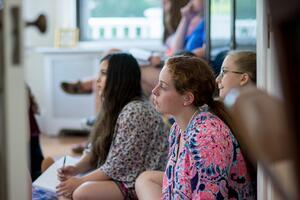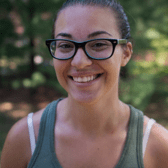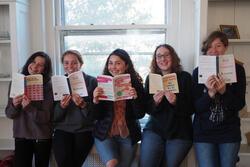Being Fearlessly Feminist
JWA's Rising Voices Fellowship helps female-identified teens develop authentic voices, strengthen their leadership through writing, and begin to influence the important conversations of the Jewish community. Of course, these rockstars are already shaking things up in their communities today. This is Part Three of the Rising Voices in Action series, a month-long series that demonstrates the many different ways in which you can challenge the status quo, no matter your gender or age.
Radical things happen when women come together. Whether it’s to plan a strike, march for the right to vote, or use their networks to spread information about birth control, when women come together, the establishment trembles. As Bella Abzug reminds us, “the establishment is made up of little men, very frightened.” If history is any indication, women who are brave enough to speak out can create an earthquake of social change, shattering any delusions little men may have about women and women’s equality.
These Rising Voices Fellows are standing up against inequality in their schools and communities––and in the face of old school sexism. In their own communities, and as Rising Voices Fellows, these young women are tackling issues like institutionalized prejudice, the wage gap, and the best ways to bring about change.
I grip the microphone and my eyes scan over the crowd. I gulp and squeak out a quick “Thank you Mr. Kelly” to preface my announcement: “Feminism Club will be meeting Sunday night to discuss the gender divide at Deerfield.” My face flushes. Blank stares and a few snickers from bored students ripple across the dining hall. Three years ago, I, along with four other girls, established the Feminism Club in perhaps the most hostile school environment in Western Massachusetts. At a boarding school known for its loyalty to tradition, heritage, and the great men of its past, Deerfield Academy was not the friendliest place for feminism. Yet, we persisted. Though it was difficult to integrate the Feminism Club into Deerfield’s culture, it was absolutely worth the fight. I’ve seen an incredible change on campus. Feminism Club has been part of a larger cultural shift: changes in the political atmosphere and the emergence of national movements and marches have brought Feminism and issues like sexual assault to the forefront of people’s lives. As we learn to embrace and support each other, the women of Deerfield, thanks in part to Feminism Club, continue to strengthen.
Bake sales are a common occurrence at my school, but before the one organized by our feminist affinity group, I had never seen one cause such a strong reaction. To reflect the gender wage gap, we priced items at $1 for men and 82 cents for women. We expected varying responses; however, we were shocked by the level of aggression from many male students. One student was so upset that he tried to form a physical blockade to prevent other students from approaching the table. Another called us bitches, and was so confrontational that a friend had to physically restrain him. For weeks after, the bake sale came up in classes and casual conversation. As successful as we were in encouraging dialogue, the bake sale had its flaws. Although we categorized the two groups as "male and "non-male," we worried about enforcing the gender binary by only offering two pricing options. We also passed out a flyer with statistics about the wage gap broken down by ethnicity and racial group, but we priced baked goods the same for all women. Despite these flaws, I’m still proud to have been part of this effort to make the student body aware of the gender wage gap.
In January I took part in the Boston Women’s March. Before deciding that I was going to attend, quite a few people told me that I shouldn’t go. They cited reasons from “women already have rights,” to “feminism isn’t cool anymore.” Once I stepped out of the train and into Boston Common, I was mad at myself for even listening to these.The first thing that I noticed was the sheer number of people. People of all ages, races, sexualities, and religions carried signs that represented their hunger for change and their longing for equality. As previous fears that I had about violence in the crowd quickly disappeared, my friends and I were met with warm smiles and the embrace of a community. The pride that I felt while marching with thousands of passionate people is something that I would never have gotten to experience if I let what was “in” pave my way. The transformation officially occurred though, when I realized that with every step of the march, my voice was becoming louder and louder. With every passing woman, man, and child, our collective strides for complete equality were finally becoming heard. Now, I couldn’t be more thankful that I attended.
Inspired by these reflections? You can check out RVF’s other blog posts. If you love the series and want to hear more about what these budding revolutionaries are doing, let us know and we can add you to our mailing list!
This piece was written as part of JWA’s Rising Voices Fellowship.










